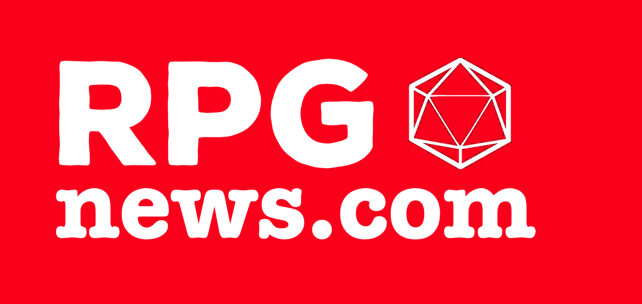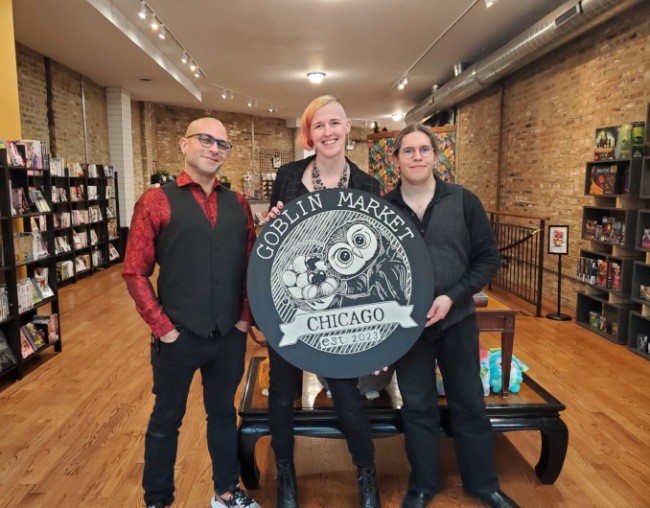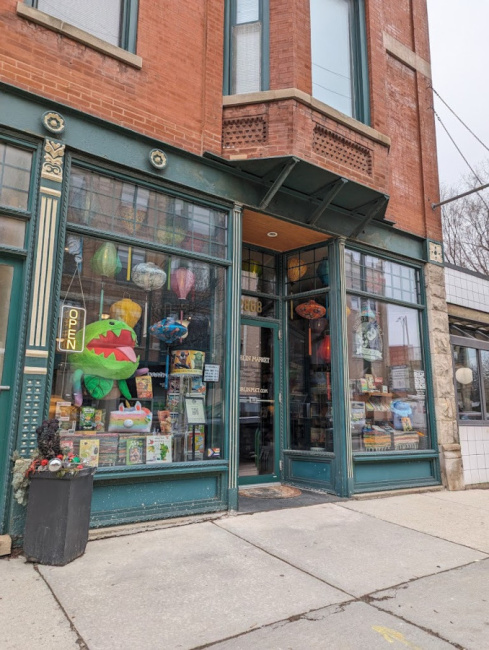Hits and Misses will feature comic retailers sharing what’s working in their shop as well as the roadblocks they’ve been running into.
Goblin Market, a manga, comics, games, and curiosities shop in Chicago, has grown considerably in its first two years. New customers discover the store every day, and it hasn’t found a normal level for performance yet, with the arrow pointing upwards since owners Don Alsafi, Ryvre Hardrick, and Daniel Dziubinski opened the doors on October 13, 2023.
But for as much as its audience has swelled, its physical location has grown even more; Goblin Market’s storefront is just over 3,000 square feet across two floors, a big space for a new shop. It was affordable because the basement was unfinished, which gave them just 1,800 square feet to work with initially. They saw the potential, so they jumped at the chance and have been working on it ever since. Since launch, they’ve renovated half of the downstairs to offer customers additional retail and community space.
That was crucial to the team’s vision for Goblin Market. Alsafi and Hardrick know retail, having worked a combined 40 years at an online comic shop. During that time, they developed a sense of the kind of store they always wished Chicago had: while the city may be filled with great comic shops, it lacked a manga-focused one.
It was a good plan. But as is often the case, plans tend to change as you learn the realities of running a retail store. The team at Goblin Market has done plenty of that since opening, with much of their learning coming from the hits and misses they’ve had along the way.
Hit: Expanding the Market instead of Attracting Existing Collectors
Understanding the local environment was essential to Goblin Market’s business plan. They couldn’t just ignore the competition.
“Chicago is a crowded market for comics,” Hardrick said. “We’re six blocks away from the closest comic shop, and three blocks past that to the next one.”
That’s part of the reason they never wanted to beat others at the same game, they wanted to offer something new altogether.
“We’re the first manga shop in Chicago,” Hardrick said.
The goal was to expand beyond the typical comic readership. It worked. Very few customers are comic shop veterans. Even fewer had a pull list before. Its audience is different than the average shop’s.
“Our customers skew younger and more femme than most comic shops,” Hardrick shared.
The shop’s overall goals resulted in initial uncertainty about whether they’d carry comics and graphic novels at all. Goblin Market decided they would because that’s where Alsafi’s passion lies. Like with its lean into manga, though, they wanted to aim at underserved audiences.
“What was important to me was not catering to existing collectors,” Alsafi said. “I wanted to have a shop where I could give somebody their first comics.”
Much of that is accomplished through curation. Goblin Market’s inventory orients on creator-driven reads rather than superheroes. Its sales have sent them further in that direction. Early on, they carried some titles that were considered essential. Customers had little interest.
“We ordered a lot of ‘evergreen’ and classic graphic novels,” Hardrick said. “We struggled to move them at all. In the two years we’ve been open, we’ve sold a whopping three copies of Infinity Gauntlet and a single Old Man Logan trade paperback, but we’ve sold dozens of Princess Jellyfish, When I Arrived at the Castle, and It’s Jeff!“
Goblin Market’s inventory is built from what its customers actually want. Manga easily leads with 33% of the shop’s sales from the past year. But other products like stickers and Danmei (Chinese queer romance novels) resonate with its audience. Those products have expanded the shop’s market, bringing in new customers who cannot find those products elsewhere.
That emphasis seems to be creating comic and graphic novel readers. Comics are one of Goblin Market’s fastest growing product lines as its customers discover the format after coming in for other material. Single issues started at just 2% of its sales. It’s now hovering around 10%.
“We are really growing on the periodical comic side,” Hardrick said.
Miss: Size Matters
The team ordered its bookshelves with traditional trade paperbacks and graphic novels in mind. The belief was that this size of book would be key to the business. That did not prove to be the case.
“We’re about to rearrange our shelves because slim, 6.5″x10″ graphic novels don’t sell well for us, with a few creator-driven exceptions,” Hardrick said.
It’s the other sizes of collections that succeed in the store. DC’s Compact Comics outperform the publisher’s standard collections. The digest editions of Invincible and Saga outsell the trade versions too, although the Compendiums are thriving. And while your standard Marvel trades go nowhere, Goblin Market can’t keep the smaller volumes of It’s Jeff! in stock.
That created a problem, both because they initially overordered on standard-sized collections and because of how that decision shaped the store’s fixtures. At that size, smaller books get lost in the depths of the shelves and larger collections don’t fit. They didn’t have the budget to replace them. That meant they had to get creative. They leveraged thrift store finds like coffee tables and greeting card spinners to display certain titles, and it’s been an effective solution at a low cost.
Still, it’s still one of the biggest regrets they have from the store’s early days, though.
“If I could go back and change one thing, it’d be avoiding deep, heavy shelves designed for standard comic-size trades,” Hardrick said.
Hit: Working with Other Businesses instead of Competing
Even though they knew there’s competition in the market, that’s not how Goblin Market views similar shops.
“Chicago has insanely cool comic, game, and book stores,” Hardrick said. “We’re not really competing with each other. We’re competing with Amazon, Barnes & Noble, the newest AAA video game, Labubus, and everything else someone can spend money on.”
That mentality is baked into the business. Hardrick even maintains a Google Map named Nerdy Chicago that’s loaded with local comic, game, and toy stores that she can hand to customers who can’t find what they’re looking for in Goblin Market. The goal is to keep sales as local as possible. They would rather work collaboratively with other Chicago-based stores than compete with one another. Hardrick shared a specific example of that.
“Chicago’s Challengers Comics + Conversation is one of our favorites. I appreciate that they have their inventory online because they’re so much heavier on superheroes than we are,” Hardrick said. “So, if someone comes in looking for something we don’t have, Challengers is up on our computer right away. They can go to Challengers and get the superhero comic they want.
“Just don’t go to Barnes & Noble.”
Goblin Market has quickly discovered that its biggest sales days correspond with multi-store events like Indie Bookstore Day. It has been so successful that they planned a Free Comic Book Day store crawl this year based on Indie Bookstore Day.
“There was more of a focus on shopping and celebration than on ‘free,'” Hardrick said. “And it was extremely successful.”
Its collaborative nature works both ways, with other shops recommending them as well. That’s why its focus on what are typically secondary products for others is such an advantage. It allows Goblin Market to be a complement to local retailers, acting as a go-to when shoppers are looking for something others don’t carry.
Miss: Community-Building without Emphasizing Profit or Avoiding Burnout
Community is essential to Goblin Market and its customer base. That’s the reason its downstairs renovation included moving couches and chairs into the space: it gives regulars an area to gather and enjoy their purchases. But community-building isn’t as easy as adding furniture and calling it a day.
“People request a lot of cool events, like book clubs and writers’ groups,” Hardrick said. “But we have to host them. We want to say yes to everything, but our time and resources are limited.“
That‘s added stress without obvious financial benefits, at times. And it extends beyond the shop into local events or conventions. Getting that kind of face time can be crucial to building awareness and expanding your customer base. But doing so without taking away from other sides of your business can be a challenge.
“There‘s only so often we can rent a car and drive out to a small convention,” Hardrick said. “Big conventions are great and make money, but they take up a lot of time where we could be focusing on other things.“
Whether it‘s external conventions, internal events, or even moderating the shop‘s Discord for customers, the team has found that community management is time-consuming and stressful work. Much of it is important, both to the business and its owners. But doing so without overtaxing themselves has been difficult. It‘s a fine line, and one they‘re still learning to walk.
“We’ve had to step back and focus more on the fundamentals of the business before we completely burn out,“ Hardrick shared.
Hit: Focusing on Other Products to Drive Profit and Differentiation
Goblin Market has an expansive product mix. You can see that in its full name. When they promote the store, it often is paired with key products like Manga, Comics, and Games in its subtitle, as well as another word that is unique to them: Curiosities. That covers a lot of material, much of which has proven to be essential.
“Our core lines are manga, graphic novels, comics, Danmei, and role-playing games,” Hardrick said. “But we also have board games, stickers, tarot cards, craft supplies, toys, art. “Whatever is on trend and catches my eye. We like to keep the almost half of the store that isn’t graphic novels and manga changing and fresh.”
“It’s the forever artist alley,” she added.
The beauty of these is they’re typically low-cost, high-turnover products that allow them to tap into what’s hot. While they may not sound like much, these products have generated both sales and foot traffic for Goblin Market.
“Stickers are one of our main sidelines,” Hardrick said. “One of the posts I do on social media is taking a picture of a sticker that I’m holding up. It’s a good and easy thing. One had over a million views last week.”
“It brought in a lot of people just for those stickers,” Alsafi added. “People who had never been in before.”
The shop curates all its products. That’s even the case for those it chooses not to carry. The market for action figures, statues, and collectible card games is competitive in Chicago. That’s why they avoided them altogether. Instead, Goblin Market emphasizes categories it knows especially well, like its wide selection of small press and local comics or its collection of indie role-playing games.
“Ryvre and Daniel are big gamers and they’re particularly passionate about the independent RPG scene. They know a lot of the local designers personally,” Alsafi said. “I love being able to tell customers we have the largest collection of indie RPGs in the Midwest.”
That expertise and product mix allows the shop to differentiate itself, and to speak to customers who haven’t found a home for their interests. That has been at the heart of Goblin Market since the start.
Miss: Not Connecting with Book Market Resources before Opening
Even with decades of retail experience, there were holes in what the team knew as they developed the store.
“We just didn’t know what we didn’t know,” Hardrick said.
That led to missed opportunities before they even opened. The team rues not capitalizing on events like pop-ups and book fairs and options like mobile stores and fundraising that could have added income as they searched for a location. More than that, not knowing about guides for new bookstores meant its initial orders included misses they’re still working off to this day.
“We struggled with opening orders. A rep could’ve given us targeted Edelweiss lists,” Hardrick said. “I panicked and overordered some Scholastic titles that we’re still selling through two years later.”
While awareness in what they were missing grew after they opened, there were still gaps. For example, it took the team months to open an account on Bookshop.org, an online marketplace where sales financially benefit local and independent bookstores, and even longer to get onboard with Libro.fm, a similar service focused on audiobooks. They’re there now, but the team knows they missed out early on.
“We left free money on the table,” Hardrick said.
Hardrick emphasized that there are plenty of resources for new stores through the American Booksellers Association and other regional trade associations that can save shops time and money. Its team didn’t learn of them until months after opening. But for other aspiring comic shops and bookstores, the value is clear.
Click Gallery below for full-size images of Goblin Market!
Read more at this site


